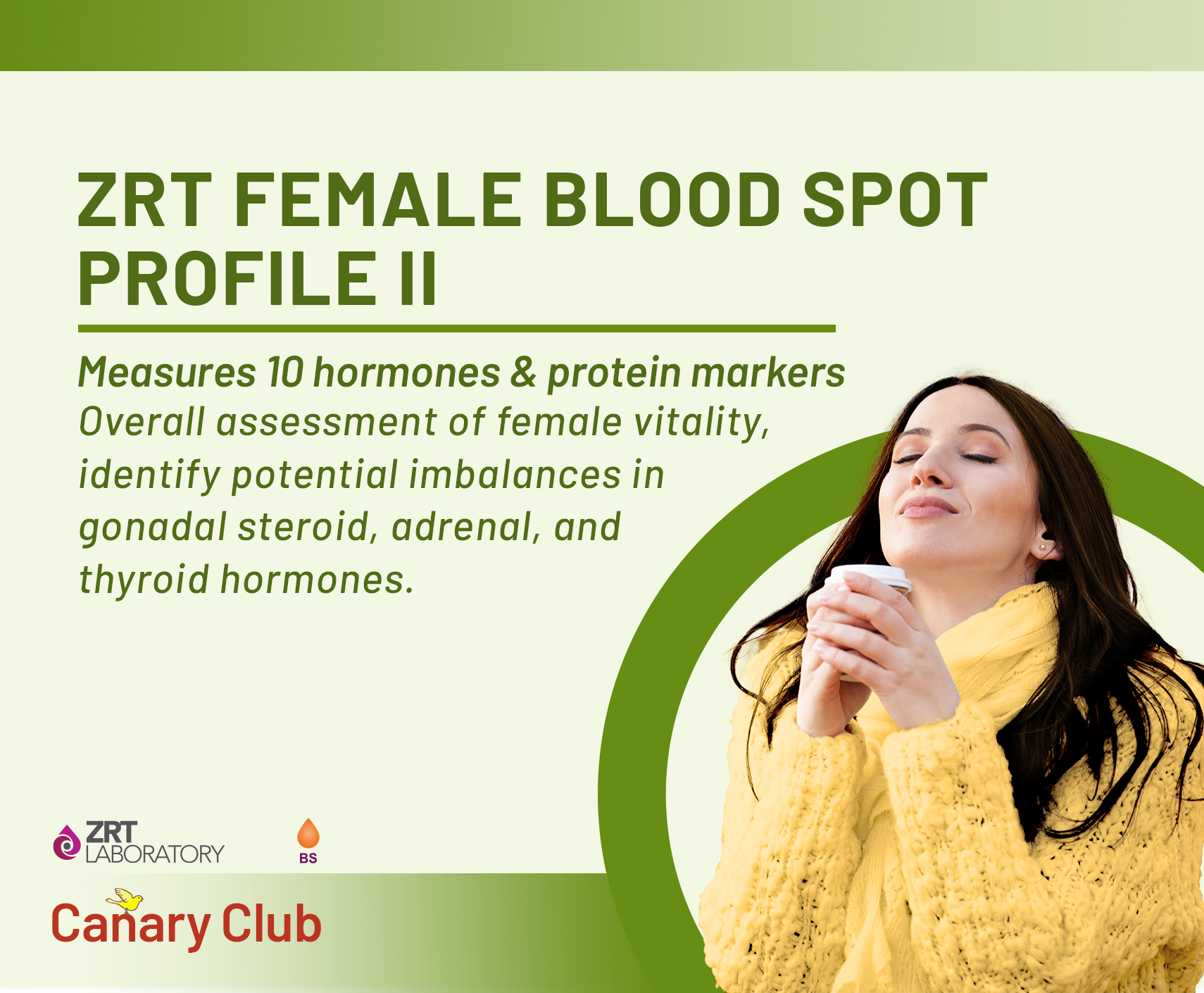Some women can become pregnant with little challenge, but for others, a hormone imbalance can complicate matters.
When Can Hormones Affect Getting Pregnant?
Pregnancy is the most natural thing in the world. For some women, it occurs with ease. However, others may experience significant challenges.
For many of those women, the underlying issue is a hormonal imbalance. The ZRT Fertility Hormone Test Kit helps women who are struggling to get pregnant identify hormone-related issues and work to normalize levels.
Female infertility affects up to 12% of married women aged 15 to 44 years, according to the Centers for Disease Control1.
What Role Do Hormones Have in Pregnancy?
Hormones play many roles during pregnancy. Fertility markers consist of these major hormones Luteinizing Hormone (LH), Follicle-Stimulating Hormone (FSH), Sex Hormone Binding Globulin (SHBG), Estrogen Estradiol (E2), and Progesterone (Pg).
Thyroid Disorders of low levels of fT3 and fT4 may actually prevent ovulation in the first place, usually indicated by no periods or irregular cycles. Autoimmune thyroid issues, resulting in elevated TPOab antibody levels to the thyroid gland can increase the risk of miscarriages. Subclinical hypothyroidism (elevated TSH with normal fT3 and fT4 levels), has been implicated as a cause of infertility.
Stress affects ovulation due to its impact on the endocrine system. Adrenal hormones DHEA-S (DS) and Cortisol (C), are at the core of virtually all bodily processes, from the “fight or flight” response to our ability to sleep, and even the ability to get pregnant and carry to term.
Of course, identifying hormonal imbalances can be challenging. Once tested, there are some therapies that help resolve a few of these hormone imbalance conditions.
There’s good news for the millions of women struggling to get pregnant and unable to do so because of imbalanced hormones. Today, there is a simpler way to determine the cause of the problem and work toward a balanced solution.
The ZRT Female Profile IIprovides conclusive information about underlying hormonal imbalances, allowing you to work with your healthcare professional to create a personalized treatment plan.
Who Should Consider Hormone Balance Testing for Infertility?
Hormone testing is a critical consideration for women struggling to become pregnant.
However, it may be a smart decision even if you are not currently trying to become pregnant.![]() For instance, you may be trying to establish a baseline to determine if you have comorbidity conditions.
For instance, you may be trying to establish a baseline to determine if you have comorbidity conditions.
It may also be a wise decision if you are planning to get married and want to assure yourself or your partner about fertility.
- You are struggling to become pregnant or carry to term
- You are experiencing symptoms of hormone imbalance
- You have been trying to conceive for at least six months
- You are at least in your mid-30s
- You have a family history of female infertility
- You want to begin planning your family and need to know your fertility status
- You have any comorbidity conditions
Common Hormonal-Related Causes of Female Infertility
While hormone imbalance may be caused by any of the conditions discussed above, several specific hormonal-related causes tend to be more common than others, after discounting things like medication and birth control.
PCOS
PCOS, or polycystic ovarian syndrome, is a leading cause of female infertility and affects up to 15% of women during their prime reproductive years.
It is usually marked by symptoms1 including one or more miscarriages, as well as difficulty managing weight, and problems with ovulation, including pain and discomfort.
The good news is that PCOS can be treated. However, before your doctor can create a treatment plan, the condition must be identified.
Tests for several PCOS-specific hormones that usually indicate this condition include:
- Follicle-Stimulating Hormone (FSH)
- Luteinizing Hormone (LH)
- Dehydroepiandrosterone-sulfate (DHEA-S)
Low Progesterone
Progesterone (P) is one of the primary hormones during pregnancy, and low levels of progesterone will also affect your ability to become pregnant. The ovaries produce progesterone naturally during the second half of the menstrual cycle, and this hormone’s primary job is to prepare the uterus for the fertilized egg.
If progesterone levels are too low, the uterus will be unprepared for egg implantation, possibly leading to the loss of the egg and difficulty or inability to become pregnant.
Other symptoms of low progesterone include migraines or headaches, irregular menstruation, mood changes, anxiety, and depression.
In addition to progesterone, several other hormones play critical roles in reproduction, including:
- Estradiol (E2)
- Testosterone (T)
- Sex hormone-binding globulin (SHBG)
- Follicle-stimulating hormone (FSH)
- Luteinizing hormone (LH)
Thyroid Disorders
Thyroid function is closely connected to fertility.
For instance, hypothyroidism can disrupt the menstrual cycle, making it harder to become pregnant.
It also interferes with the release of eggs from the ovaries and increases the risk of both miscarriage and premature birth.
Hyperthyroidism carries the same risks. Diagnosing thyroid disorders and problems can be challenging, but measure levels of several key thyroid hormones to help pinpoint the problem and ensure your healthcare professional can create a customized treatment plan. These hormones include the following:
- Free triiodothyronine 3 (fT3)
- Free triiodothyronine 4 (fT4)
- Thyroid peroxidase (TPO)
- Thyroid-stimulating hormone (TSH)
TSH, or thyroid-stimulating hormone, testing is used to determine the level of this hormone in the bloodstream. High levels indicate potential hypothyroidism, while low levels may indicate hyperthyroidism.
Levels of fT4 are measured in relation to TSH – low fT4 and elevated TSH indicate potential hypothyroidism, while the reverse indicates potential hyperthyroidism. On the other hand, fT3 is measured to help determine the severity of hyper or hypothyroidism.
Stress and Trauma
Cortisol – the same hormone associated with stress-related weight gain – can also affect your ability to get pregnant.
Low levels may create conditions in which the immune system is unprepared for implantation of a fertilized egg. High levels, on the other hand, can inhibit ovulation in the first place.
The kit also measures cortisol levels at four specific times during a single day to ensure an accurate reading and an in-depth understanding of cortisol production throughout the day.
E1 Estrone and E3 Estriol (Add-Ons)
E1 Estrone: E1 (estrone) is estrogen and plays a role in reproduction. It works with estradiol and estriol, and is produced by the ovaries, but is also produced by the adrenal glands, as well as by adipose tissue. Estrone is responsible for female sexual development and function. Low levels can cause problems with sexual and reproductive function. Low levels of estrone have also been connected to certain types of cancer, as well as osteoporosis, although the relationship is not completely clear.
E3 Estriol: E3 (estriol) is one of the most important hormones for the health of the mother and baby during pregnancy. It is present in your body at low levels before pregnancy, but production greatly increases at the onset of pregnancy. Levels peak within the body shortly before giving birth. During pregnancy, the placenta produces estriol, but it is also secreted by the adrenal glands. It encourages the growth of the uterus and also helps your body prepare for childbirth.
Your Hormone Management Testing Plan
When you know you have done everything you can to manage your feelings—yet continue to feel despair or apathy—it is time to consider testing.
- Step 1: Start by selecting the ZRT Blood SPot Profile II, using the guide below.
- Step 2: Take the test to establish the starting hormone and n baseline at the onset of your plan. Consider developing your plan alongside:
- a licensed health care provider for medical conditions, especially for severe "out of normal range" results
- or a health care consultant for nutrition and supplements that will support your results
- Step 3: Develop a plan based on your lab test results, establishing a one-year or more outlook.
- Be diligent to address the factors you can, such as work stress, poor diet, lack of exercise.
- Keep logs of your intakes, and daily routines related to your hormone test results.
- Step 4: After 6-12 months of actively working on your plan, take the same test again, or take a smaller panel that tests specific areas of concern to determine your progress.
Alternatives
Basic Reproductive Hormone Trio Test
Single hormone tests (good for affordable re-testing):
Luteinizing Hormone (LH)
Follicle-Stimulating Hormone (FSH)
1“Polycystic Ovary Syndrome (PCOS).” Mayo Clinic, Mayo Foundation for Medical Education and Research, 3 Oct. 2020, www.mayoclinic.org/diseases-conditions/pcos/symptoms-causes/syc-20353439.
1.“Infertility.” Centers for Disease Control and Prevention, Centers for Disease Control and Prevention, 16 Jan. 2019, www.cdc.gov/reproductivehealth/infertility/index.htm.
2. “Polycystic Ovary Syndrome (PCOS).” Mayo Clinic, Mayo Foundation for Medical Education and Research, 3 Oct. 2020, www.mayoclinic.org/diseases-conditions/pcos/symptoms-causes/syc-20353439.
https://lomalindafertility.com/infertility/women/hormonal-imbalance/
https://www.parents.com/getting-pregnant/infertility/treatments/hormone-imbalance-and-pregnancy/
https://www.mayoclinic.org/diseases-conditions/female-infertility/symptoms-causes/syc-20354308
https://www.nichd.nih.gov/health/topics/infertility/conditioninfo/causes/causes-female
https://www.cdc.gov/reproductivehealth/infertility/index.htm
https://www.mayoclinic.org/diseases-conditions/pcos/symptoms-causes/syc-20353439
https://www.healthline.com/health/womens-health/low-progesterone#low-progesterone
https://www.healthline.com/health/common-thyroid-disorders
https://www.thyroid.org/thyroid-function-tests/
https://www.hormone.org/your-health-and-hormones/glands-and-hormones-a-to-z/hormones/estriol
https://medlineplus.gov/lab-tests/estrogen-levels-test/



